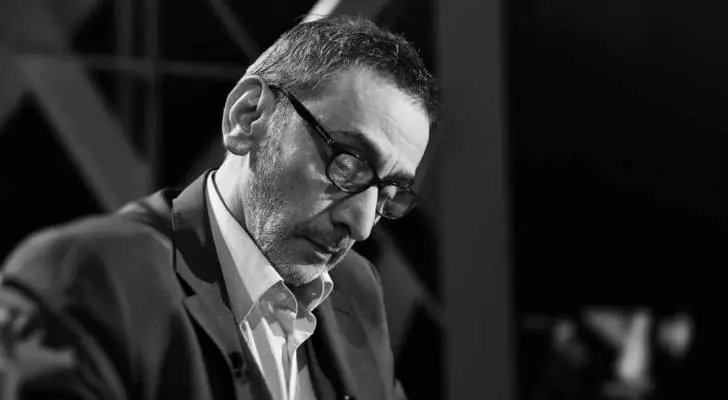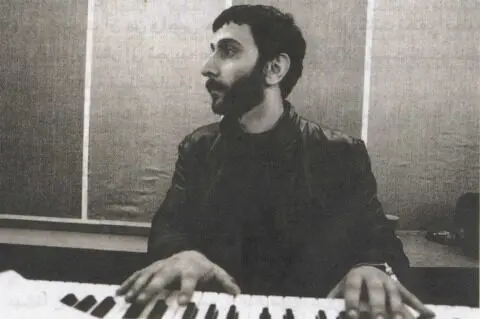7 Powerful Reasons Why Ziad Rahbani Was the Soul of Arab Resistance Art

Ziad Rahbani, Lebanese cultural icon and political artist, performing in Beirut 26/7/2025
July 26, 2025 Hour: 2:23 pm
Ziad Rahbani, the legendary Lebanese artist and political voice, has died at 69. Discover how his music, theater, and activism shaped a generation’s fight for justice.
7 Powerful Reasons Why Ziad Rahbani Was the Soul of Arab Resistance Art
Beirut mourns a giant. On July 27, 2025, Ziad Rahbani, the revolutionary playwright, composer, and political conscience of Lebanon, passed away at the age of 69. His death marks the end of an era—but the beginning of an eternal echo in the hearts of those who believe art must serve the people, not power.
A son of legends—Fairuz, the voice of the Arab world, and Assi Rahbani, co-founder of the iconic Rahbani musical dynasty—Ziad could have chosen comfort. Instead, he chose rebellion. He forged a path that fused satire, jazz, Arabic maqam, Marxist critique, and street poetry into a singular voice that challenged corruption, warlords, and foreign domination.
Ziad Rahbani didn’t just make art—he weaponized it against oppression, becoming the most fearless cultural critic in modern Arab history.
From his early days writing poetry at 12 to his final radio broadcasts, Rahbani remained a truth-teller in a region where silence is often bought. His plays, songs, and columns didn’t just entertain—they exposed the rot in Lebanon’s sectarian system, mocked the hypocrisy of the elite, and gave voice to the poor, the displaced, and the defiant.
As President Joseph Aoun said in a national statement: “Ziad Rahbani was a complete intellectual and cultural state—a living conscience, a rebel voice against injustice, and a faithful mirror of the tormented and marginalized.”
Ziad Rahbani: The Revolutionary Behind the Music and the Message
Born on January 1, 1956, in Antelias, Ziad grew up in a household where music was sacred. But while his parents’ work often carried romantic and national themes, Ziad’s art was raw, urgent, and politically charged. He came of age during the Lebanese Civil War (1975–1990), a time of fragmentation, violence, and foreign intervention—and his work became a soundtrack of resistance.

While others sang of love and nostalgia, Ziad Rahbani sang of class struggle, occupation, and the absurdity of war.
His early plays—such as Sahriyyeh (1973), Nuzul al-Surur (1974), and Bil nisbeh la bukra shu? (1978)—used absurdist theater and biting satire to dissect Lebanon’s political chaos. In Film amriki taweel (1980), he mocked Western cultural imperialism. In Shi fashel (1983), he ridiculed the futility of sectarian politics. And in Bikhuss al-karameh wal-shaab al-aneed (1993), he celebrated the resilience of the Palestinian and southern Lebanese people under Israeli occupation.
These works weren’t just performed—they were events, often staged in war zones or refugee camps, where art became survival.
External Link: BBC Arabic – Ziad Rahbani’s Legacy of Resistance
External Link: Al Jazeera Documentary – “The Rebel of Beirut”
The Voice of the People: Journalism, Radio, and Unfiltered Truth
Beyond the stage, Ziad Rahbani was a journalist and radio provocateur. For decades, he wrote for major Lebanese newspapers like An-Nahar, Al-Akhbar, and Al-Nidaa, where his columns combined philosophical depth, dark humor, and revolutionary fervor.
His radio programs—especially on Radio Al-Hurriya—were legendary. Speaking in a deep, gravelly voice, he would dissect daily politics with a mix of sarcasm and sorrow, often ending with a jazz piece or a forgotten Fairuz B-side. He didn’t just report the news—he interrogated it, asking: Who benefits? Who suffers? Who is silenced?
In a media landscape often censored or bought, Ziad Rahbani’s voice was one of the last truly free ones in the Arab world.
He was a committed member of the Lebanese Communist Party, and his politics were never hidden. He openly supported the Palestinian resistance, condemned Israeli occupation, and criticized Arab regimes that normalized with Israel. His solidarity wasn’t symbolic—it was lived, through art, speeches, and presence in southern Lebanon during invasions.
Geopolitical Context: Why Rahbani Mattered Beyond Lebanon
Ziad Rahbani’s influence extended far beyond Beirut. Across the Arab world—from Cairo to Baghdad, Tunis to Gaza—artists and activists saw in him a model of intellectual courage. In an era when many cultural figures align with power, Rahbani remained anti-establishment to the end.
His death has been mourned by Palestinian movements, including the Popular Front for the Liberation of Palestine (PFLP), which issued a statement calling him “a living national conscience and an intellectual who stood with the poor and rejected injustice.”
Rahbani’s art was never neutral—it was always on the side of the oppressed, making him a target of elites and a hero to the people.
His critique of sectarianism, neoliberalism, and foreign intervention resonated deeply in a region scarred by war, dictatorship, and displacement. He warned of the dangers of identity politics, long before it became a global debate, and mocked the idea that Lebanon’s confessional system could ever bring peace.
Even as Lebanon’s economy collapsed and protests erupted in 2019, Rahbani’s words from the 1980s and 90s felt eerily current. His legacy is not frozen in time—it is alive in every chant against corruption and every song of resistance.
A Family of Giants: The Rahbani Legacy Reimagined
While Ziad was the son of Fairuz and Assi Rahbani, he never sought to replicate their legacy—he redefined it. Where the Rahbani family of the 1950s–70s created a golden era of romantic Lebanese nationalism, Ziad dragged that tradition into the age of revolution and ruin.
He composed music that blended jazz, Arabic scales, and protest lyrics, often performing with his band in smoky clubs or war-damaged theaters. Songs like “Akhbar el-Harb” (News of the War) and “Al-Khawaga” (The Foreigner) became anthems of dissent.
Yet, despite his rebellious image, he deeply respected his mother’s art. In interviews, he spoke of Fairuz not just as a singer, but as a symbol of dignity—though he often joked that she would “disown him” for his politics.
Ziad Rahbani honored his family’s legacy by refusing to repeat it—choosing truth over tradition.
Reactions: A Nation in Mourning, a Region in Reflection
The outpouring of grief has been immense. Prime Minister Nawaf Salam said: “Lebanon loses an exceptional creative artist and a free voice that remained faithful to justice and dignity.” Parliament Speaker Nabih Berri lamented: “The melody is sad, the words are broken, and the black curtain falls on a human chapter that does not die.”
Social media flooded with tributes. Young activists shared clips of his plays. Musicians covered his songs. Palestinians posted images of him with Yasser Arafat and fighters from the south.
Even critics—those he mocked in his plays—acknowledged his unmatched brilliance. As one columnist wrote: “We hated being exposed by him. But we knew he was right.”
Conclusion: The Artist Who Never Surrendered
Ziad Rahbani did not die a quiet death. He died as he lived: on the front lines of truth. His body may be gone, but his voice lingers—in the jazz notes of a Beirut night, in the chants of protesters, in the laughter of those who finally see the absurdity of power.
He proved that art is not decoration—it is resistance. That culture is not escape—it is confrontation. And that **a single artist, armed with a pen and a piano, can shake the foundations of an unjust world.
Ziad Rahbani’s death is not an end—it is a call to continue the fight with creativity, courage, and conscience.
As Lebanon buries one of its greatest minds, the world remembers: the rebel has fallen. The revolution continues.
Internal Link: /lebanese-cultural-icon
External Link: PFLP Statement on Ziad Rahbani – July 2025
Author: JMVR
Source: Al Mayadeen

